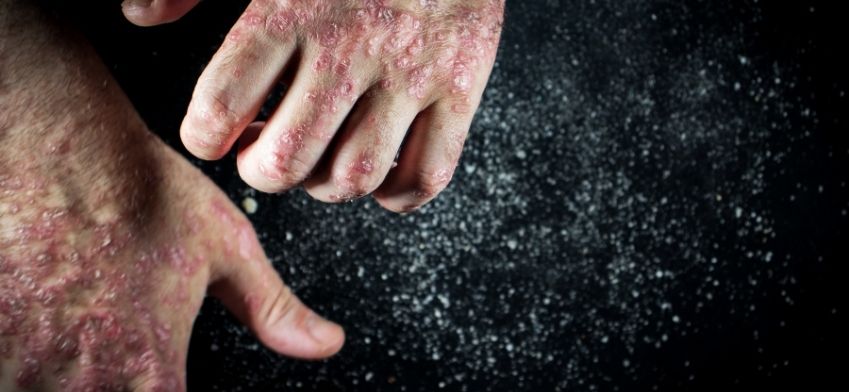Psoriasis and eczema are skin conditions with similarities in manifestations and causes. They both cause skin damage resulting in redness and are caused by a disruption of the immune system. A genetic predisposition is observed in both cases. However, these two pathologies are very different and must be distinguished to be treated correctly.
Psoriasis: origins, manifestations and treatment
The origin of psoriasis is due to excessive turnover of skin cells resulting in red patches covered with a white film, scales, which itch or give a burning sensation. There is no current medical treatment that completely cures psoriasis. Topical or oral treatments provide relief and allow remission of the disease. Professionals increasingly associate them with UV, light therapy or laser sessions. It can begin and develop at any age but is more common in adolescence or adults after age 30. Psoriasis flares can be due to injury, infections, smoking, alcoholism, or traumatic psychological shock.
Eczema: a younger skin disease!
Eczema is also a skin disorder. But, it is caused by hypersensitivity linked to many stimuli. The skin reacts to allergens. These include milk, eggs, peanuts, nickel, chemicals, dust or animal hair. It is also manifested by red patches with vesicles containing a serous substance that develops on all body areas.
Atopic eczema, the most common form of this disease, affects infants and toddlers. This form of the pathology disappears when they are between 5 and 7 years old. The flare-ups go away completely in the majority of cases. The immunological deficiency at the origin of eczema explains the hypersensitivity of the epidermis. Eczema grows more in dry climates and large cities. It never affects the nails or mucous membranes like psoriasis. You can get the best Psoriasis treatment New York with a specialist doctor.
Psoriasis
Psoriasis is a chronic inflammatory disease of immune origin (immune dysfunction causing inflammation) affecting the skin and joints through environmental exposure and genetic predisposition.
The subcutaneous impact of psoriasis is invisible, just like that on the joints. One-third of those affected have psoriatic arthritis, which causes stiffness, swelling and pain in the joints and adjacent areas.
The chronic inflammation of psoriasis often goes hand in hand with cardiovascular disease, type 2 diabetes, anxiety, and depression. If you have psoriasis, adopt a healthy lifestyle to counter these conditions and get tested for each of them.
Symptoms of psoriasis
Symptoms of psoriasis can appear at any age but are most commonly present between the ages of 15 and 25 in people of any ethnicity. The most common are raised red patches covered with a thick amalgam of silvery scales.
These patches of dead skin affect 80% to 90% of people with psoriasis. They can be sparse or extensive and are often symmetrical in shape. They can appear and occur anywhere on the body but usually focus on the elbows, knees, scalp, trunk, and buttocks.
Anything that attacks your immune system can trigger a pain outbreak: a cold, tonsillitis or an ear infection. And quit smoking, if that’s your case.
Treatment of psoriasis
There are many options. Since treatment effects vary depending on the person, a mixture of over-the-counter and prescription drugs or light therapy can provide relief or remission.
For moderate to severe cases, with or without rheumatism, a therapeutic small molecule disease-modifying agent, such as methotrexate and systemic or biological retinoids, is customarily used. Biologics are designed to mimic proteins and molecules in their natural state. They are injected intravenously.
Eczema
Eczema is also called atopic dermatitis, is a common allergic skin disease that causes itching. We do not know its exact cause, but genetic and environmental factors are recognized agents.
Exposure to agents outside or inside the body, such as detergents, pollen, foods, and some bacteria, can trigger inflammation and cause symptoms of eczema.
Symptoms of eczema
The primary symptom is itchy skin. Its location is specific to each. Children mostly get it on the cheeks, elbows, knees and scalp. In adults, it occurs in the folds of the face and neck, on the wrists, elbows, knees and ankles.
Sometimes we scratch to the point of reducing the skin’s defences against infection. Chronic eczema can be the result of systemic inflammation in the body. It makes the skin more vulnerable to skin infections. Staph infections and herpes require immediate attention because they can spread to the rest of the body.
Treatment of eczema
The chronic itching associated with eczema can become unbearable or even disabling. Its intensity can be more exasperating than a mosquito bite or a reaction to ragweed. But antihistamines won’t help you here.
The key to itchy, dry skin is repeated hydration. Psoriasis treatment New York is done with topical drugs, corticosteroids or the like. As with psoriasis, biologics and light therapy work on eczema—immunosuppressant’s help control symptoms.
Also Read: Liver Disease: Causes, Types, & Other Information





